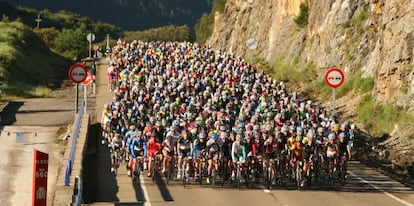Amateur cycling: the latest doping victim
Banned former professionals are taking over fun events such as the grueling Quebrantahuesos

On June 22, for the second year running, Ángel Vázquez Iglesias was the first rider to reach the summit of the 1,795-meter Portalet, the highest of the four climbs that make up the 200-kilometer Quebrantahuesos (Bonecrusher), Spain's largest non-professional cycle race, which starts and finishes in Sabiñánigo, in the foothills of the Pyrenees.
The route was lined with cycling fans, and as usual local people had come out in huge numbers to support friends and family members competing in the grueling event. But as Vázquez peddled his way comfortably to the high point of the pass, a voice from the side of the road shouted: "EPO, EPO!"
A former professional, in 2003, Vázquez tested positive for Erythropoietin, otherwise known as EPO, the hormone that increases aerobic power by stimulating the body's production of red blood cells - the substance used by disgraced seven-time Tour de France winner Lance Armstrong. In 2011, while under a doping ban, Vázquez tested positive for EPO, receiving another suspension.
Growing numbers of former professionals suspended after testing positive for EPO and other illegal stimulants are competing in races like the Quebrantahuesos and, in the opinion of some local people, are taking over events that are supposed to give amateurs a chance to shine.
My son won the Quebrantahuesos twice, and he was as clean as a whistle"
"They should enter for the Vuelta [Spain's equivalent of the Tour] and leave this to the people from round here. My son won the Quebrantahuesos twice, and he was as clean as a whistle," says one woman from Sabiñánigo.
A young man standing next to her agreed as he pointed out David Busto Portillo, accused in 2011 of involvement in a network that bought banned substances from an Andorra pharmacy. He came in sixth in last year's race. Six of the first 10 riders in last year's Quebrantahuesos were either suspended or under investigation for doping.
Xavier Bartrolí, one of the organizers of the Quebrantahuesos, says that he is unhappy about the presence of banned former professionals. "But there isn't much we can do. This race has never been about winning; if you finish it you can consider yourself a winner. This is an event that is open to all. It is as if you arranged a day out with a group of friends, with a lot muscle involved."
Although there is no prize money for winning the Quebrantahuesos, nor are there any doping checks, Vázquez admits that some participants prepare for the event as though it were a professional race.
"The first 200 past the line are very good riders; to an extent, this is becoming an increasingly serious race rather than a day out, which is what it was originally meant to be."
In response, the International Cycling Union says that it can't do much about stopping professionals from entering Quebrantahuesos, even if it is included in the organization's list of official events. But it adds that riders who have been banned are not allowed to participate. In Vázquez's case, no one was alerted.
The Quebrantahuesos has grown into a major tourism and cycling event since it was set up in 1990. The number of entrants has grown to more than 8,000, requiring greater organization. The route is closed off by more than 150 police officers, helped by around 1,000 volunteers. The town of Sabiñánigo is taken over by fans for the weekend, and there is a trade fair.
Luis Irisarri, the secretary of the Basque Cycling Federation, one of the groups sponsoring Quebrantahuesos, is also unhappy about the takeover by former professionals. "Sadly, this event is no longer what it was. What we are seeing is that while professional cycling is being cleaned up, more and more amateurs are using illegal substances. I really can't see the sense in that."
Tu suscripción se está usando en otro dispositivo
¿Quieres añadir otro usuario a tu suscripción?
Si continúas leyendo en este dispositivo, no se podrá leer en el otro.
FlechaTu suscripción se está usando en otro dispositivo y solo puedes acceder a EL PAÍS desde un dispositivo a la vez.
Si quieres compartir tu cuenta, cambia tu suscripción a la modalidad Premium, así podrás añadir otro usuario. Cada uno accederá con su propia cuenta de email, lo que os permitirá personalizar vuestra experiencia en EL PAÍS.
¿Tienes una suscripción de empresa? Accede aquí para contratar más cuentas.
En el caso de no saber quién está usando tu cuenta, te recomendamos cambiar tu contraseña aquí.
Si decides continuar compartiendo tu cuenta, este mensaje se mostrará en tu dispositivo y en el de la otra persona que está usando tu cuenta de forma indefinida, afectando a tu experiencia de lectura. Puedes consultar aquí los términos y condiciones de la suscripción digital.








































